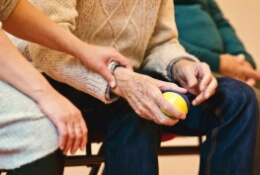Is a neurodegenerative genetic disorder that affects muscle coordination and leads to cognitive decline and dementia. It is the most common genetic cause of abnormal involuntary writhing movements and also results in gradual damage to specific areas of the brain. Our dedicated team of specialist carers are trained to assist residents to manage symptoms, some of whom may require one-to-one 24 hour care within a care home.
Depending on the care needs of each individual resident we can offer a passive or more intense physiotherapy programme to improve strength and mobility together with speech and language therapy and special diets for those with swallowing difficulties.
The Symptoms of Huntington’s Disease: People can start to show the symptoms of Huntington’s disease at almost any age but most will develop problems between 35 and 55. Early symptoms include personality changes, mood swings and unusual behaviour and are often overlooked at first. The disease affects movement with early symptoms including slight uncontrollable movements of the face, and jerking, flicking, fidgety movements of the limbs and body. As the disease progresses, the uncontrollable movements are more frequent and extreme. Movements become slow and muscles more rigid, until coordinated movement becomes very difficult, and mental abilities generally decline into dementia. Complications such as pneumonia, heart disease and physical injury from falls reduce life expectancy to around twenty years after symptoms begin.
Stonehaven’s specialist Drake Unit team work closely with the residents’ GP and assessment teams, so you or your loved one are receiving the best possible care fully coordinated with multi-disciplinary support teams. Support also comes from the Regional Huntington’s Disease Association.

